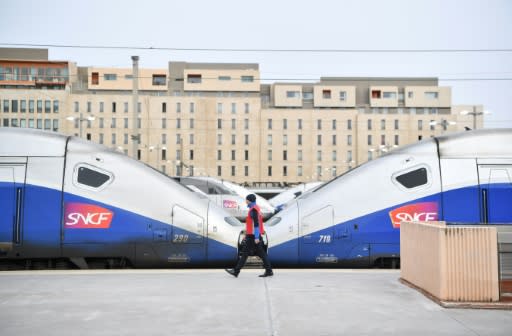Striking French rail staff up pressure on government
French rail workers sought to up the ante in weeks of strikes Monday, slashing the number of trains running as the government insists it will not back down in the standoff. Monday marked the 18th day of strikes since early April against President Emmanuel Macron's overhaul aimed at making the SNCF, France's heavily indebted state rail operator, more competitive. Fewer and fewer rail staff have been taking part in the strikes as the weeks have gone on, and the UNSA union had said it was "vital to deal a heavy blow" to pressure the government into making concessions. But despite Monday being billed by unions as a "day without rail workers", just a little under 28 percent of SNCF's total staff actually walked off the job, according to company management. But more than 74 percent of train drivers were on strike and only a third of high-speed TGV and suburban trains were operating and a fifth of regional services, according to company management. SNCF management admitted there had been a "jump in (union) mobilisation" and described Monday as a "very difficult day" with "heavy disruption" for France's 4.5 million daily rail passengers. Cables were also mysteriously cut in the southern port of Marseille and the northwestern region of Normandy, in what the SNCF said appeared to be deliberate acts of sabotage aimed at further snarling traffic. Hundreds of railway workers also took to the streets of Paris to protest. A separate strike in the Paris region caused further disruption on RER suburban trains, while in Marseille, students joined forces with rail workers to block trains arriving at Saint-Charles station, a major hub. - 'Everything blocked' - "They've blocked everything. We understand why," passenger Romeo Andre, aged 42, told AFP. "But at some point you have to stop penalising others." Macron wants to deny new SNCF recruits historic benefits such as early retirement and a guaranteed job for life, part of plans to cut the company's operating costs as European rail travel opens to competition. Rail workers object to this, as well as plans to turn the SNCF into a joint-stock company whose shares would be held by the state -- a move they see as a first step towards privatisation despite government denials. The strikes are set to continue two days out of every five until June 28. But they have been slipping, with just 14.5 percent of SNCF staff taking part in last Wednesday's walkout. Opinion polls suggest a majority of French voters back the reforms. The lower house of parliament has already given them the green light, and the Senate is to vote on them this month. On Monday, unions launched a consultation of the SNCF's 147,000 staff on whether or not they back the government's plans. SNCF chief Guillaume Pepy has dismissed the consultation, which will run until May 21, as having "no legitimacy", but unions say it will help them decide how to move forward. A trial vote held in the southern city of Nice last week produced a 95 percent vote against the reforms. burs-kjl/js/bp/dl In the French port city of Marseille, traffic was halted for several hours by a power cut which the SNCF said was likely an "act of sabotage" A striking railway worker on a traffic lights waves a union flag near Gare de l'Est station in Paris on May 14, 2018 during a protest against proposed government reforms of the French state-owned railways



